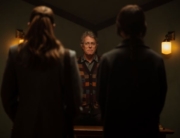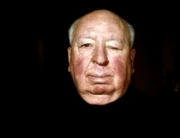Split screen and misleading dream sequences: Brian De Palma’s latest brings back his flourishes from the original and hugely influential Carrie to his best film in a decade, a remake of a French satire/thriller that’s only three years old, which also has a clunky title, Love Crime. Though elegant, that austere film (the last by director Alain Corneau) blasted viewers with frosted air. Though Passion doesn’t quite give off heat, it never takes itself too seriously. De Palma wallows in the excesses of his cutthroat corporate connivers and remains faithful to the original’s plot precision. Virtually actor proof, his movie withstands performances that aren’t as wild and liberated as his direction.
Just for the record, De Palma had second thoughts about the use of the split screen in Carrie during the prom massacre scene. In his 2001 director’s commentary, he stated that he now saw it as a distraction. Four decades later, his reliance upon split screen seems less frantic and is more of an effective way to overlap two sequences while misleading the audience—I’ll say no more on this point. De Palma also loves askew angles and filtered light; some scenes look like they were filmed day-for-night.
Passion has verve that obliterates the first film’s morose somberness. Committing crime is fun. It’s coarser, but De Palma takes it easy on the kink, though. He sashays through the storyline, where Corneau took methodical measures. It’s still about sexism, latent desires, and capitalism at an impersonal cost—and unashamedly decadent. A woman with many agendas, powerhouse ad executive Christine (the white blonde Rachel McAdams) has replicas of the orgiastic Pompeii frescos in her living room. She has groomed a protégée, Isabelle (the restricted Noomi Rapace), and steals her underling’s brilliant idea for a major campaign, gets a plum promotion, and publicly humiliates the mousy, taciturn Isabelle. The ongoing give-and-take is vicious and satisfying as a guilty pleasure.
For the most of the movie, McAdams wears shades of red, usually set against an ivory or all white, minimalist backdrop. The contrast in color in the art direction adds a touch of attention-getting luridness, with a 1960s sheen. The musical score begins with a playful oboe solo, as though Miss Marple has had glass of champagne or two to ready herself for another Agatha Christie romp. Pino Donaggio’s score also brings back the vibe of an early 1970s Italian thriller.
Both films are drenched in innuendo. In the first scene, Christine snuggles next to Isabelle and purrs, “I think we make a really good team” and then kisses the brunette on the lips. (Hair color is very important.) Then male interruptus. After Christine’s late-night rendezvous arrives (yet another workplace colleague—they mustn’t have time to mingle outside of the office), Isabelle departs, but not before Christine gifts her with a scarf to keep her warm.
The dialogue added by Natalie Carter, a co-writer of the original screenplay, sounds stilted—perhaps because English is the second (or third or fourth) language of the international cast—within the Berlin-based offices (look out the window and there’s the Reichstag). The biggest departure from the French version is the gender change of Isabelle’s assistant, now a henna-haired young German woman. Earlier, men lurked in the background, ready to give or take away a promotion. This time around, sisters are doin’ it for themselves.
To get a better idea of the first film, all you need to know is that the original boss was played by Kristin Scott Thomas, who, according to director Nicolas Winding Refn, can turn on the bitch switch with alacrity. McAdams, however, is tentative, her voice ethereal and girlish. It’s the type of role that needs no boundaries. Likewise, the underdog Isabelle, who hides under her bangs, is a wet blanket compared to Rapace’s turn in the original version of The Girl with the Dragon Tattoo. There’s the sense that if the budget and time allowed, livelier takes would have been filmed.







Leave A Comment